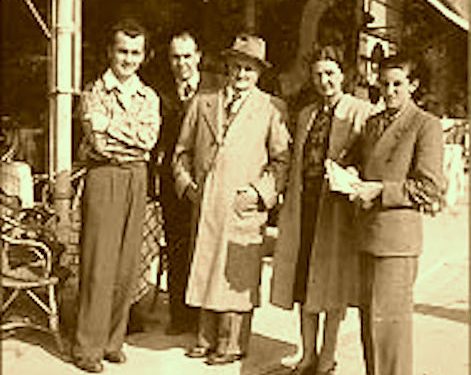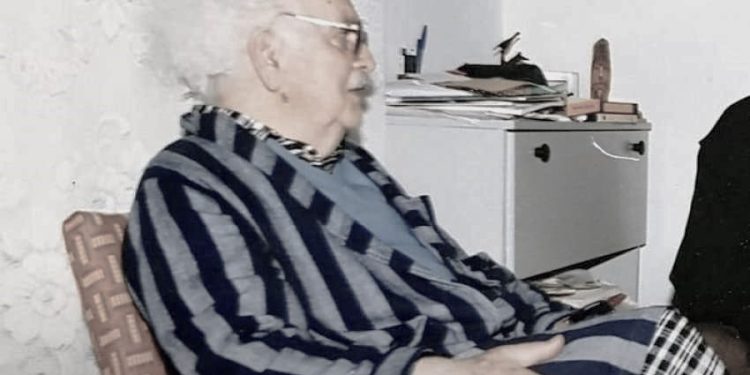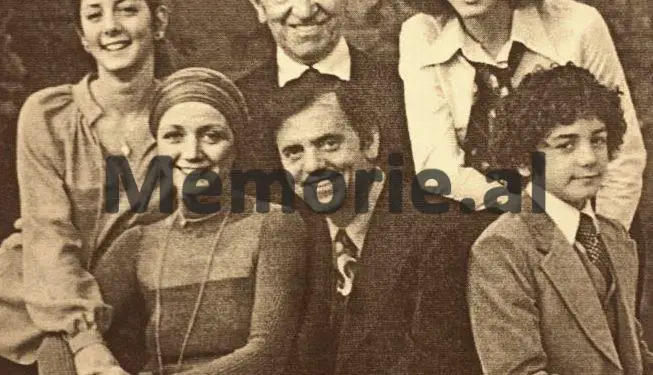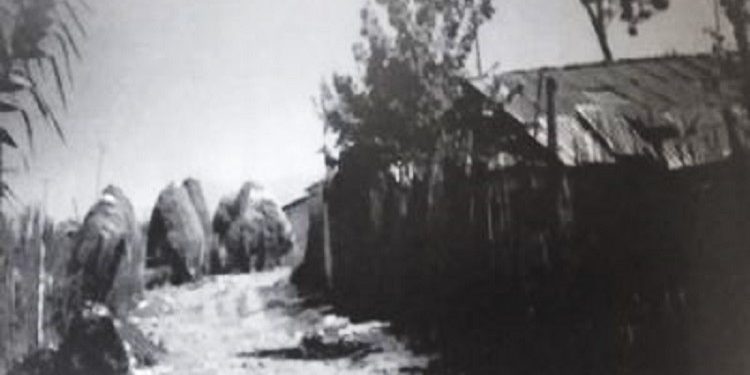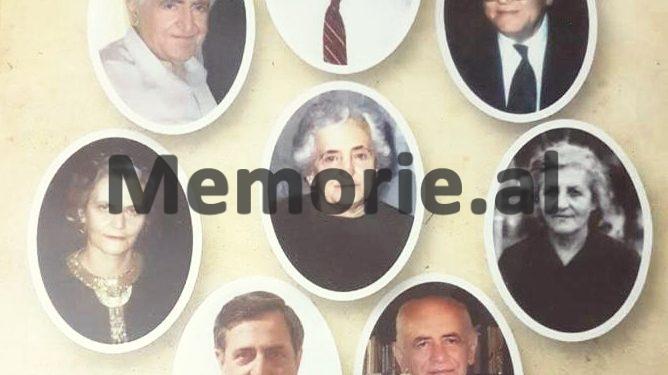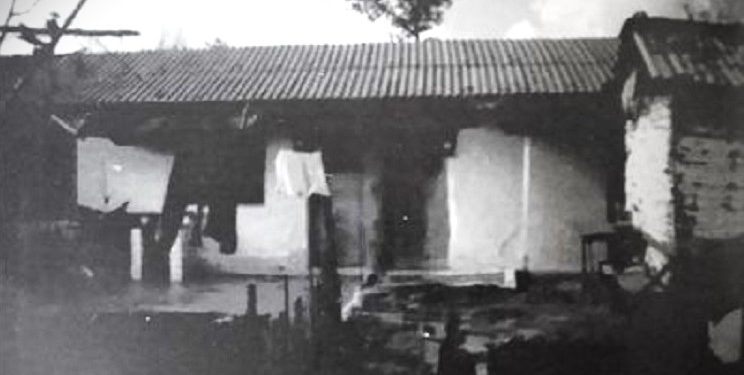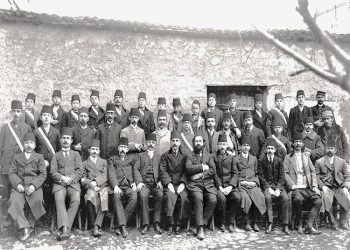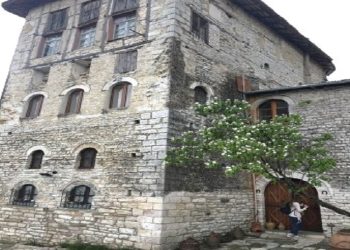By Namik Mehmeti
Memorie.al / With the famous Sokoli family, we had an early friendship, especially with Ibrahim, since my father, Et’hem Rrema (Mehmeti), had been in the Shkodra prison with the intellectual who had studied law in Belgrade. I even remember that when my father was released from prison in 1953, when I was 12 years old, one of the first visitors who came to congratulate me and drink the occasional coffee was the late Ibrahim Sokoli. But with the advent of Democracy, meetings with the Sokoli family were even more frequent. Ibrahim, after returning from exile, despite his advanced age, created his own family. And his wife was a daughter of a family as well-known as the Sokols, Dosti from Gjirokastra: the daughter of the patriot and nationalist, Hasan Dosti, a family known for its ideals for the National Front, where Hasan himself was one of the ideologists and leaders of that political and military formation.
Shanisha Dosti, whom I met in the characteristic Sokol house, in the Dergut neighborhood, in the early 1990s, has remained fixed in my memory, her nobility, intelligence and warm conversation. The house where Ibrahim and Shanoja lived was an entrance with a kitchen on the first floor and a bedroom. Sufficient, someone would say, for a couple of pensioners, but remembering the years of prisons and internments, a difference like day and night.
Those aspects that I experienced from this nationalist couple (Ibrahimi of the Zogist side and Shano of the Ballist side) and in particular from Hasan Dosti’s daughter, are also the main reason and impetus that encouraged me to go these few times. With the advent of Democracy in the early 1980s, the Zogists of the National Organization “Legal Movement”, organized by its chairman Dr. Fuad Muftija, after half a century in exile, surprised the entire Tirana airport administration when they entered Albanian soil with Kingdom passports, without accepting Albanian certificates or passports.
One of the objectives of the National Organization “Legal Movement” was to make this party organization official in Albania. For this, many legal procedures had to be undertaken and a group of Albanian legalists had to be formed, to prepare the Congress of this Organization in Tirana.
Almost all those who came from the Diaspora, America, Belgium, Canada, France, etc., unanimously, together with the Zogists who had mostly been released from the prisons and internments of communist Albania, were of the same opinion that this preparatory group, that is, of a new party in Albania, should be provisionally led by the respected lawyer, Ibrahim Sokoli. Despite his age and the illnesses he had suffered during the years of the communist dictatorship, he accepted the task.
For some important meetings, I and the noble Shkodra native, the Zogist Ferid Lluja, accompanied him to Tirana by taxi, but mostly the Zogists knocked on the door of the Sokolajs’ house, where Shanoja was the one who opened the gate, welcomed them and served them coffee with an open heart and respect for everyone: both those she had known in prison or in exile in Savër in Lushnja, as well as the younger ones she knew for the first time, but for their families she had an accurate knowledge and memory. Of those who came to this house, many were fellow sufferers with Ibrahim and Shano, or escapees from the communist regime, such as: Ramiz Mena, Hamit Kurti, Ahmet Kolgjini, Sait Preni, Akil Basha, Gafur Spahia, Enver Shaska, Skënder Kalaja, Lin Martini, etc.
This family was honored and respected by the entire political emigration that came to Albania, from time to time, as well as representatives of the Royal Court, such as Abedin Mulosmani, former minister of the Royal Court, Skënder Zogu, Ylli Spahiu, etc., but Dr. Fuad Muftija and representatives of the OKLL, entered and left this house, taking with them the warmth that Shanoja brought to them, as always with a big heart, serving coffee and, without feeling it, with a book in her hand, she would go to the second floor and again, when the friends left, she would be the first to see them off.
In the conversations that took place while enjoying coffee, I learned a lot from the memories of these Zogists who had aged prematurely from the suffering of Enever Hoxha’s dictatorial regime. They spoke of the girl from Gjirokastra with great respect for her manly attitude, despite all the misfortunes that the Dosti family had gone through. I had the opportunity to speak to this nationalist couple alone. I offered them my desire to make their suffering under the dictatorship known, but always with a refusal that contained a civic culture, they avoided these “offers”, even appearing on television screens.
From conversations with their fellow sufferers, I had learned that Shanoja had been friends at the “Queen Mother” Institute with Nexhmie Hoxha, who had also entered the Dostejs’ house. I very carefully, waiting for her to close the pages of the books she was reading, asked her to tell me something about her youthful life. “I have a lot to tell, but I do not want to become a witness today, for those beautiful years in my youth, after the misfortune of losing my mother and brother. I do not want to appear as a heroine who seeks to benefit from the establishment of Democracy”, – she answered me with sweet language and modesty.
Ibrahimi, as in the “agreement” with his wife, was also reluctant to talk about his activities during the Kingdom (he had also been to Mukje, where the agreement known by the same name was signed, he said, as a courier) and about the suffering of prison and internment. But when Shanoja was on a calm day, without the health problems that old age was making more difficult for both her and her husband, she did not hesitate to talk about the suffering in the Kuçova prison and the internment in Lushnje.
“Even today when I remember those sufferings, I tell myself that God has forgiven us two lives. The women and girls of the most famous families, from Shkodra to Gjirokastra, educated and with Western culture, we were treated as if we were in Nazi camps, with hours of mud and water. What kept us alive was the company and friendship we had with each other. We were known as a family since our youth and here in the internment camps, this friendship and companionship became like being part of a family. We helped each other, both during work and when we got sick”!
That day when the cinematographer, Ilia Terpini, took that photo, Shanoja turned to Ibrahim:
– “This photo is also the wedding photo, you fool.”
I teased her: – “But where did the wedding take place?” Ibrahim’s eyes lit up.
“In the internment camps, especially in Savër in Lushnje, several families were created and we elderly people followed each other’s example and I was very lucky with Shano, as he encouraged me and served me tirelessly, as I often became ill”, – Ibrahimi told me.
The well-known cameraman of the former “Shqipëria e Re” film studio, the late Ilia Terpini, made many recording plans in the characteristic Shkodra house of the Sokols. He also recorded the elderly couple, including this photo that he gave me among many others. This photo from 1994 expresses the radiance of the two intellectuals who represented two great doors in Shkodra and Gjirokastër, even though on their shoulders, not only the years of old age weighed heavily, but also the suffering that their friends and comrades of their youth caused them as soon as they took power. Not only did they turn their backs on them, but they didn’t even want to know them.
In the Dergut neighborhood, where many families with the surname Sokoli live, old and young women, before going to their homes, would turn around and meet Shano, offer her care and as always, she, with her characteristic smile, would not miss drinking her morning coffee with her neighbors, who still remember her with fondness and respect, but not only this woman who quickly became Shkodranized, with the customs and traditions of Shkodra.
They showed the same respect for another couple who lived, just as quietly, but proudly: brother and sister, Safete and Hodo. He had spent a life in the prisons of Burrel, while the sister had taken to the streets of Albania, to be near her brothers, in prisons or internment camps. Memorie.al




